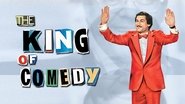thedarkknight-99999
Scorsese took some risks to turn a familiar concept that is actually impossible to work on screen, or at least that what I thought.
A lot of familiarity has been revealed at the first half of the third act of the movie along with some clichéd dialogue. Also, the pacing slowed down a bit at the very beginning of the third act. That being said, these flaws didn't bother me so much as the rest of the third act was brilliant!That's by no means what I expected. I thought it's kinda light comedy, but it turned out to be a very subtle dark comedy. Still consider it a more light-hearted version of Taxi Driver! Very under-appreciated, though.(8/10)
edwagreen
An absolute ridiculous farce. It's a good thing that Robert De Niro stuck to dramatic acting for most of his career.Of course, it was unusual to see Jerry Lewis in a rather serious part and he came through nicely as the kidnapped victim.The picture tried to bring out what the American people will accept as success, no matter how preposterous and asinine.De Niro comes across as a real nuisance as he sets out to literally hound the Lewis character to recognize him. Ignored at every turn, he resorts to the ultimate kidnapping and is able to go on television with his ridiculous monologue.Inane, that's really foolish.
Matt Greene
Much like Rupert Pupkin steadily working his way into Jerry Langford's life, The King of Comedy is making its way up my personal Scorsese list. It's study of loneliness, fantasy, and celebrity is so acute and palpable, with De Niro giving one of his best performances in a career full of best performances. As unsettling as it is hilarious, and that final comedy act…it's just everything.
kittyvista
The King of Comedy was billed as a "dark comedy," but it didn't reach the levels of absurdity needed to be genuinely comedic. The movie had tremendous potential to be either very funny or very suspenseful, but it maintained a much too moderate approach to be either.The character of Hubert Pupkin was intended to be comedic; Pupkin instead was written and played as fairly likable and moreover, relatable. Yes, he's an adult living in his mother's basement (something that wasn't trendy in 1986) and yes, he has an elaborate fantasy life that motivates his actions, but there were moments in which many viewers could empathize with him. His repeated efforts to get his comedy routine heard by Jerry Langford, followed by the repeated brush-offs by Langford's staffers are very reminiscent of many job applicants' attempts to get an interview, only to be e-mailed a form letter stating "Although your credentials and accomplishments are admirable, we have chosen to pursue applicants who are better suited to the position...." The audience is led to both pity Pupkin for his lack of insight, but admire him for his persistence. Pupkin isn't so comedic when he looks like a great number of people in the audience who have succumbed to the popular message of "follow your heart.... follow your dreams..." without regard for the consequences.The character of Jerry Langford (Jerry Lewis) is sadly underdeveloped in the movie as well. The character isn't given a lot of lines, so there is no way the audience is led to either like him or hate him. Other than the "mob of fans" scene at the start of the movie and the interaction he has with the obnoxious woman on the telephone, we don't see Langford as being continually oppressed by the demands of a voracious audience. Langford is shown as attempting to be gracious to Pupkin and his other star-obsessed fan, Masha, both of whom take his polite responses as invitations. Even though he has little material with which to work, Jerry Lewis transitions from comedian to serious actor very well in this role.The ending is also not all that satisfying. Pupkin gets his wish - to appear on Langford's program - by kidnapping Langford using a toy gun. He delivers his comedy routine, which is primarily a recitation of an abusive, dysfunctional childhood, to the incomprehensibly wild applause of the audience, and he is arrested. His fame ultimately comes not from his performance, but from the book he writes about kidnapping Jerry Langford and the media focus on that event. Pupkin is neither a hero, nor is he a villain. All in all, The King of Comedy was unfulfilling. Had Pupkin been written to be a little more sinister, obsessive and driven, this would have been an excellent thriller. Had Pupkin been less likable and without the pathos, it would have leaned more toward the comedy it was intended to be. As it is, it merits the audience reaction it received when first released: "What was that we just watched?"In many ways, the movie was ahead of its time. The theme of "fame at any price" is much more relevant in today's "Youtube" and "reality TV" environment, where people with no noticeable talent become "stars" through unabashed self-promotion (the Kardashians) or feats of incredible stupidity (the criminals who post their criminal behavior for all to see). With a little retooling, a talented screenwriter could redo this movie for today's audience and develop it to fulfill it's potential.






